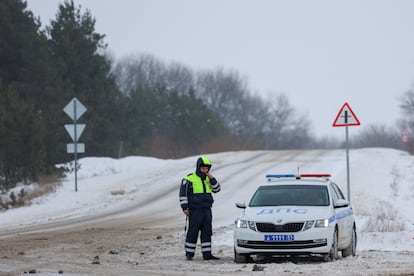Ukraine rules out the possibility that prisoners of war were on board the downed Russian military plane
The Defense Ministry says that only the crew was on board, and President Zelenskiy is demanding an international investigation


According to the Ukrainian Defense Ministry, the Russian military aircraft that crashed on Wednesday in the Russian province of Belgorod was not carrying prisoners of war. Moscow claims that the Il-76 was shot down by Ukrainian anti-aircraft missiles and that it was carrying 65 Ukrainian soldiers for a prisoner exchange that was to take place that day. On Thursday, Andriy Yusov, the spokesman for the Ukrainian Defense Ministry’s Intelligence Services (GUR), asserted that they only have evidence that five crew members were on board the aircraft; theirs were the only corpses that entered the morgue.
On Wednesday, the GUR confirmed that a prisoner exchange was to take place that day, but Russia canceled it because Ukrainian servicemen allegedly died on the plane. Yusov said in an interview on Radio Svoboda that the crashed plane was actually supposed to carry prominent Russian political and military representatives, but at the last moment the Security Services (FSB) prevented them from boarding. According to the GUR, the Il-76 took off from Belgorod with only five crew members. This coincides with a report published on Wednesday morning by the Ukrainian news agency Interfax, according to which the Ukrainian military shot down the plane as it was leaving the Belgorod airport.
Along with the Ukrinform agency and the daily Pravda, Interfax quoted sources from the General Staff and the Defense Ministry as saying that the aircraft was carrying armament, specifically S-300 missiles. Yusov has not ruled out that the aircraft was also carrying units of these anti-aircraft rockets.
On Wednesday, the GUR and President Volodymir Zelenskiy himself had conveyed messages that assumed the possibility that the POWs were indeed on the Il-76. Defense intelligence stressed that Moscow had not followed the usual protocols for reporting the arrival of an aircraft with prisoners. “Perhaps we are talking about planned and deliberate actions by Russia aimed at destabilizing the situation in Ukraine and weakening its international support,” the GUR said in a statement. Zelenskiy charged that Russia “is playing with the lives of prisoners, with the feelings of their relatives and the emotions of Ukrainian society.” The president demanded an international investigation to clarify what happened.
The Security Services of Ukraine (SSU), which belong to the Ministry of Internal Affairs, have opened a criminal investigation to determine the prisoners’ whereabouts and to assess whether Russia has violated international law, which requires the state that has imprisoned them to guarantee their safety.
Yusov explained that, according to information gathered by the GUR in Belgorod — a province bordering Ukraine and intensively infiltrated by its agents — the Russian FSB prevented civilian emergency services personnel from accessing the site of the incident.
The Ukrainian Ombudsman, Dmytro Lubinets, has also questioned the lack of evidence provided by Russia about the truthfulness of the prisoners’ deaths. In an interview on state television news, Lubinets said that, based on the information obtained so far, it cannot be certain that dozens of people were flown on the Il-76: “We cannot say that there were prisoners of war. From analysis of the photos and videos that have come to light, if there were corpses, if the Russians had provided images or videos of our prisoners, they would have used them.” Lubinets insisted on the theory that the plane landed in Belgorod, loaded material and took off. Thus, contrary to what Russian Foreign Minister Sergey Lavrov claimed, the plane would not have been shot down on its approach to the province bordering Ukraine to carry out the exchange.
Russia maintains that the aircraft was transporting prisoners of war and has called an emergency meeting of the U.N. Security Council to address the catastrophe, to be held this Thursday.
In nearly two years of war, Ukraine and Russia have done 48 prisoner exchanges, which have allowed over 2,800 Ukrainians to return to their homes, according to the Ukrainian government. Russia has not made public the total number of its military returnees.
In July 2022, 51 Ukrainian prisoners were killed in a bombing of the facilities where they were being held in Donetsk province. Each country accused the other of being responsible for the attack. Kyiv and Moscow reached an agreement with the United Nations and Turkey for an independent international investigation to determine what happened, but in the end Russia backed out of the agreement.
Sign up for our weekly newsletter to get more English-language news coverage from EL PAÍS USA Edition
Tu suscripción se está usando en otro dispositivo
¿Quieres añadir otro usuario a tu suscripción?
Si continúas leyendo en este dispositivo, no se podrá leer en el otro.
FlechaTu suscripción se está usando en otro dispositivo y solo puedes acceder a EL PAÍS desde un dispositivo a la vez.
Si quieres compartir tu cuenta, cambia tu suscripción a la modalidad Premium, así podrás añadir otro usuario. Cada uno accederá con su propia cuenta de email, lo que os permitirá personalizar vuestra experiencia en EL PAÍS.
¿Tienes una suscripción de empresa? Accede aquí para contratar más cuentas.
En el caso de no saber quién está usando tu cuenta, te recomendamos cambiar tu contraseña aquí.
Si decides continuar compartiendo tu cuenta, este mensaje se mostrará en tu dispositivo y en el de la otra persona que está usando tu cuenta de forma indefinida, afectando a tu experiencia de lectura. Puedes consultar aquí los términos y condiciones de la suscripción digital.








































